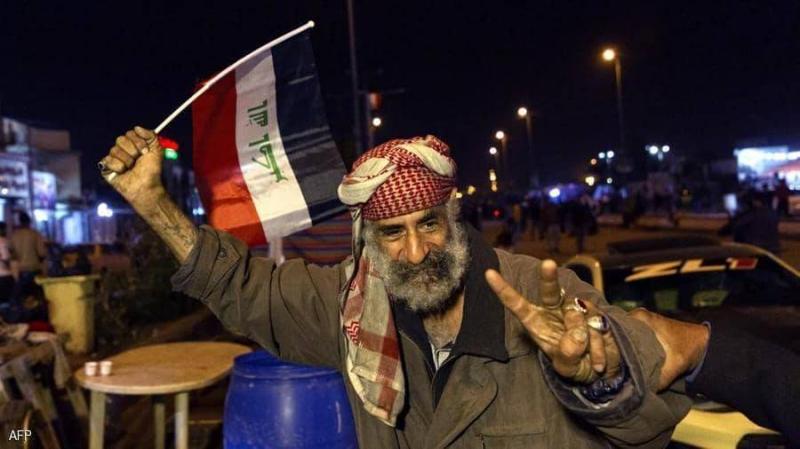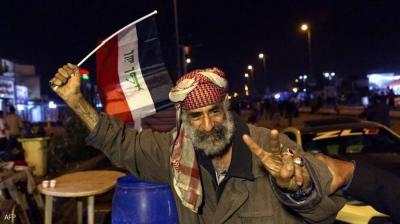Political and public circles in Iraq are eagerly awaiting a parliamentary session dedicated to interrogating security leaders regarding the deaths and injuries of thousands of protesters during the October 2019 demonstrations. Iraqi activists are demanding a public session to question military leaders in the presence of the victims' families to push for answers regarding the "mystery" of the assassinations and abductions that the country has witnessed in recent times.
At the end of last month, the leader of the Hikma Movement, Ammar al-Hakim, directed members of his parliamentary bloc "Iraqis" to summon security leaders to address the crimes of kidnapping and assassination of activists. Soon after, the leader of the Victory Alliance, Haider al-Abadi, announced that his coalition, in collaboration with other state forces, is moving to activate parliamentary interrogations and accountability to pressure for the identification of the killers involved in political crimes.
For his part, Parliament Speaker Muhammad al-Halbousi stated he would approve the request for the session as soon as it arrives officially at his office, affirming the possibility of the attendance of security leaders or Popular Mobilization Forces for questioning under the parliament's dome.
Since current Prime Minister Mustafa al-Kadhimi assumed office in May 2020, he launched a wide campaign and formed several committees to investigate the killings of activists and protesters during the tenure of his predecessor, Adel Abdul-Mahdi, with the number of victims estimated in the thousands among killed and injured activists.
In recent months, Iraqi security agencies have reached several gangs involved in the killings of activists, such as journalist Ahmad Abd al-Samad and activist Omar Fadel, among others, in addition to several elements of the military establishment proved to be involved in gunfire, as announced by the Ministry of Interior on multiple occasions.
### Questions and Concerns
This parliamentary move has raised questions about its authenticity and whether it is part of election mobilization or a response forced by protest conditions and local activists' pressure, alongside continuous international condemnation of the treatment of protesters at the hands of militias. Others have questioned the parliament's ability to make significant progress on this file, given the complexities surrounding it, and the disputes occurring among political blocs, conflicting positions, and varying visions, especially with the presence of political entities linked to armed factions that consistently refuse to accept any accusations against them, as seen in the case of the arrest of Hashd leader Qasim Muslih.
Iraqi protest activist Mahmoud Ahmed told "Sky News Arabia" that "the political blocs silence during the last period regarding the killings, kidnappings, and abuses faced by activists has vanished now that the election season has arrived. They suddenly remembered the existence of more than 600 dead and over 25,000 injured, beginning this movement to defend them, which confirms the exploitation of this sensitive file in electoral propaganda, especially since the issue of interrogations is complicated and requires preparation, organization, identification of the negligent parties, and structuring of discussion points, then obtaining the approval of the parliament presidency to complete it."
The Iraqi activist adds, "The protesters did not oppose the political blocs; rather, we welcomed this late movement, and we will support any similar course, as it is expected; the pressure from the international and Arab community has rapidly reflected on political behavior domestically, and we have seen the parliament take a step forward."
Recently, a large number of Iraqi activists and bloggers have mobilized, either through protests or by launching extensive social media campaigns demanding the disclosure of the killers of the demonstrators. A tweet from UN Secretary-General António Guterres that was published yesterday was understood as support for the Iraqi calls for accountability, where he stated, "When those in power escape their corruption, people lose confidence in their governing institutions, and democracies weaken through mockery and despair." He added, "Ending impunity is a fundamental step towards a new social contract based on trust, integrity, and justice."
### A Long Path Ahead
Iraqi parliament member from the legal committee, Saeb Khader, believes that "the parliament reflects the societal environment, the street, and its requirements, as it must express its aspirations and the demands it raises, which compels all parliamentarians to align under this movement to advance in this difficult file." He notes in a statement to "Sky News Arabia" that "revealing the killers of the demonstrators will establish the rule of law, as real states are those that protect their citizens."
Regarding the possibility of achieving progress in this file, Khader confirms that "any movement in this direction will have an impact, even if slight, but it will be the first step towards a long path, and subsequent steps should follow; sometimes the difficulties lie in the beginnings, but thereafter it becomes something natural."
Observers of Iraqi affairs have noted a shift in the speech of popular protests regarding the killers of demonstrators, which has quickly transformed into a prevailing political discourse that the international community has responded to swiftly. The UN mission in Iraq recently issued a comprehensive report on the killings that the country has witnessed during the period of protests. This shift provides momentum for al-Kadhimi's government to continue the investigations it is conducting in parallel with the parliamentary movement, tightening the noose on the armed groups involved in acts of killing.




